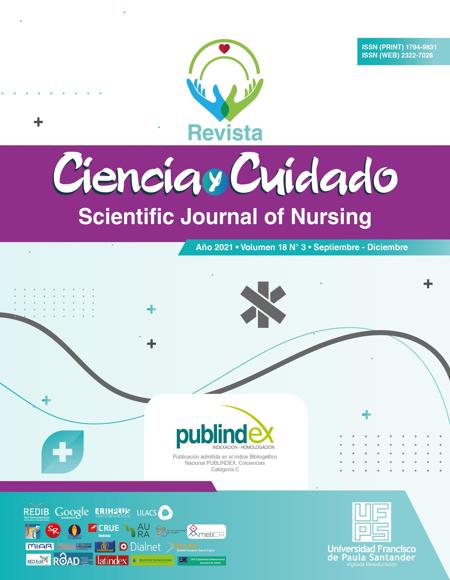Autoethnography and reflections on the COVID-19 pandemic
Autoetnografía y reflexiones en la pandemia por COVID-19
Main Article Content
The COVID 19 pandemic is a global issue that not only has caused deaths and contagion, but also has affected the life of healthcare workers. For this article a narrative is performed through autoethnography, approaching the changes within a health institution generated by this situation, allowing to transfer the practice experiences to the theory and analyze situations during the assistance of infected patients. The objective is to describe some of the experiences from the professionals and nursing assistants about the assistance of patients with COVID-19 in a university hospital in Colombia and what implies the nursing care implies during a pandemic, using the metaparadigms and evidencing the impact of all these changes in people and society in general. Conclusion: The nursing professionals will always be on the first line, providing the best care experience for people, their families as well as accompanying them during the processes of birth, growth, life and death. Although there are technologies, pandemics, social issues around the globe, nursing will keep participating, expressing its feelings and transcending in the lives of people as actors of human care
Downloads
Article Details
Wu F, Zhao S, Yu B, Chen YM, Wang W, Song ZG, et al. A new coronavirus associated with human respiratory disease in China. Nature. 2020;(579) 265-269. DOI: https://doi.org/10.1038/s41586-020-2008-3
Jin Y, Yang H, Ji W, Wu W, Chen S, Zhang W, et al. Virology, Epidemiology, Pathogenesis, and Control of COVID-19. Viruses. 2020;12(4):372. DOI: https://doi.org/10.3390/v12040372
University Johns Hopkins. Coronavirus COVID-19 (2019-nCoV) [Internet]. Baltimore; 2021 [Consultado el 6 de febrero de 2021]. Disponible en: https://coronavirus.jhu.edu/map.html.
Instituto Nacional de Salud. Coronavirus en Colombia [Internet]. Bogota; 2021. [Consultado el 6 de febrero de 2021]. Disponible en: https://www.ins.gov.co/Noticias/Paginas/Coronavirus.aspx.
Lai J, Ma S, Wang Y, Cai Z, Hu J, Wei N, et al, et al. Factors Associated With Mental Health Outcomes Among Health Care Workers Exposed to Coronavirus Disease 2019. JAMA Netw open. 2020:e203976. DOI: https://doi.org/10.1001/jamanetworkopen.2020.3976
Gaitán A. Review Essay: Exploring Alternative Forms of Writing Ethnography. Forum Qual Sozialforsch / Forum Qual Soc Res. 2000;1(3). https://doi.org/10.17169/FQS-1.3.1062
Ellis E, Adams T, Bochner A. View of Autoethnography: An Overview . Forum Qual Sozialforschung-FQS. 2011;12(1).
Bochner AP, Ellis C. Personal Narrative as a Social Approach to Interpersonal Communication. Commun. Theory, 1992 2(2) 165-172.
Couser GT. Recovering bodies : illness, disability, and life-writing. University of Wisconsin Press; 1997.
Denzin N. Interpretive Biography. Newbury Park, CA:sage; 1989.
Zaner R. Conversations on the edge : narratives of ethics and illness. Washington, DC: Georgetown University Press; 2004.
Blanco M. Autoetnografía: una forma narrativa de generación de conocimientos. Andamios . 2012;9:49-74.
Ngunjiri F, Hernandez K, Chang H. View of Living Autoethnography: Connecting Life and Research | Journal of Research Practice. J Res Pract. 2010;6(1).
Hernández JR. Manual de Autobservación. (Asociación Canaria para el Desarrollo de la Salud a través de la Atención, ed.). [Internet]. España; 2018.Disponible en: https://www.laatencionalpresente.com/wp-content/uploads/2018/07/Manual-de-Autobservacion-2018.pdf
Fernandez R, Lord H, Halcomb E, Moxham L, Middleton R, Alananzeh I, et al. Implications for COVID-19: A systematic review of nurses’ experiences of working in acute care hospital settings during a respiratory pandemic. Int J Nurs Stud. 2020;111:103637. DOI: https://doi.org/10.1016/j.ijnurstu.2020.103637
Liu Q, Luo D, Haase JE, Guo Q, Wang XQ, Liu S, et al. The experiences of health-care providers during the COVID-19 crisis in China: a qualitative study. Lancet Glob Heal. 2020; 8(6):e790-e798. DOI: hhttps://doi.org/10.1016/S2214-109X(20)30204-7
Sun N, Wei L, Shi S, Jiao D, Song R, Ma L, et al. A qualitative study on the psychological experience of caregivers of COVID-19 patients. Am J Infect Control. 2020;48(6):592-598. https://doi.org/10.1016/j.ajic.2020.03.018
Fawcett, J. "The metaparadigm of nursing: International in scope and substance". En K. Krause y P. Astedt-Kurki (Eds.), International perspectives on nursing: A joing effort to explore nursing internationally , Finland, Tampere University, Department of Nursing, 1992.
Yuriditsky E, Horowitz JM, Nair S, Kaufman BS. Simulation-based uptraining improves provider comfort in the management of critically ill patients with COVID-19. J Crit Care. 2021;61:14-17. DOI: https://doi.org/10.1016/j.jcrc.2020.09.035
Balderas M. Administración de los servicios de enfermería . Séptima edición. (McGraw-Hill, ed.).; 2015.
Su S, Wong G, Shi W, Liu J, Lai ACK, Zhou J, et al. Epidemiology, Genetic Recombination, and Pathogenesis of Coronaviruses. Trends Microbiol. 2016;24(6):490-502. DOI: https://doi.org/10.1016/j.tim.2016.03.003
Zhang W, Du RH, Li B, Zheng XS, Yang XL, Hu B, et al. Molecular and serological investigation of 2019-nCoV infected patients: implication of multiple shedding routes. Emerg Microbes Infect. 2020; 9(1): 386–389. DOI: https://doi.org/10.1080/22221751.2020.1729071
Harapan H, Itoh N, Yufika A, Winardi W, Keam S, Te H, et al. Coronavirus disease 2019 (COVID-19): A literature review. J Infect Public Health. 2020; 13(5):667-673. DOI:https://doi.org/10.1016/j.jiph.2020.03.019
Krishnan A, Hamilton JP, Alqahtani SA, A.Woreta T. A narrative review of coronavirus disease 2019 (COVID-19): clinical, epidemiological characteristics, and systemic manifestations. Intern Emerg Med.2021:1-16. https://doi.org/10.1007/s11739-020-02616-5
Lai CC, Liu YH, Wang CY, Wang YH, Hsueh SC, Yen MY, et al. Asymptomatic carrier state, acute respiratory disease, and pneumonia due to severe acute respiratory syndrome coronavirus 2 (SARS-CoV-2): Facts and myths. J Microbiol Immunol Infect. 2020; 53(3):404-412. DOI: https://doi.org/10.1016/j.jmii.2020.02.012
Da Silva SJ, Silva CT, Guarines KM, Mendes RP, Pardee K, Kohl A, et al. Clinical and Laboratory Diagnosis of SARS-CoV-2, the Virus Causing COVID-19. ACS Infect Dis. 2020; 6(9):2319-2336. DOI: https://doi.org/10.1021/acsinfecdis.0c00274
Terpos E, Ntanasis-Stathopoulos I, Elalamy I, Kastritis E, Sergentanis TN, Politou M, et al. Hematological findings and complications of COVID-19. Am J Hematol. 2020; 95(7):834-847. DOI: https://doi.org/10.1002/ajh.25829
. Huarcaya-Victoria J. Consideraciones sobre la salud mental en la pandemia de COVID-19. Rev Peru Med Exp Salud Publica. 2020;37(2):327-334. https://doi.org/10.17843/RPMESP.2020.372.5419
Newby JC, Mabry MC, Carlisle BA, Olson DW, Lane BE. Reflections on nursing ingenuity during the COVID-19 pandemic. J Neurosci Nurs. 2020; 52(5):E13-E16. DOI: https://doi.org/10.1097/JNN.0000000000000525
Liu YE, Zhai ZC, Han YH, Liu YL, Liu FP, Hu DY. Experiences of front-line nurses combating coronavirus disease-2019 in China: A qualitative analysis. Public Health Nurs. 2020; 37(5):757-763. DOI: https://doi.org/10.1111/phn.12768
Herdman T, Kamitsuru S. Diagnósticos Enfermeros: Definiciones y clasificación 2018-2020. NANDA-I. Undécima ed. España: Elsevier. 2019.






